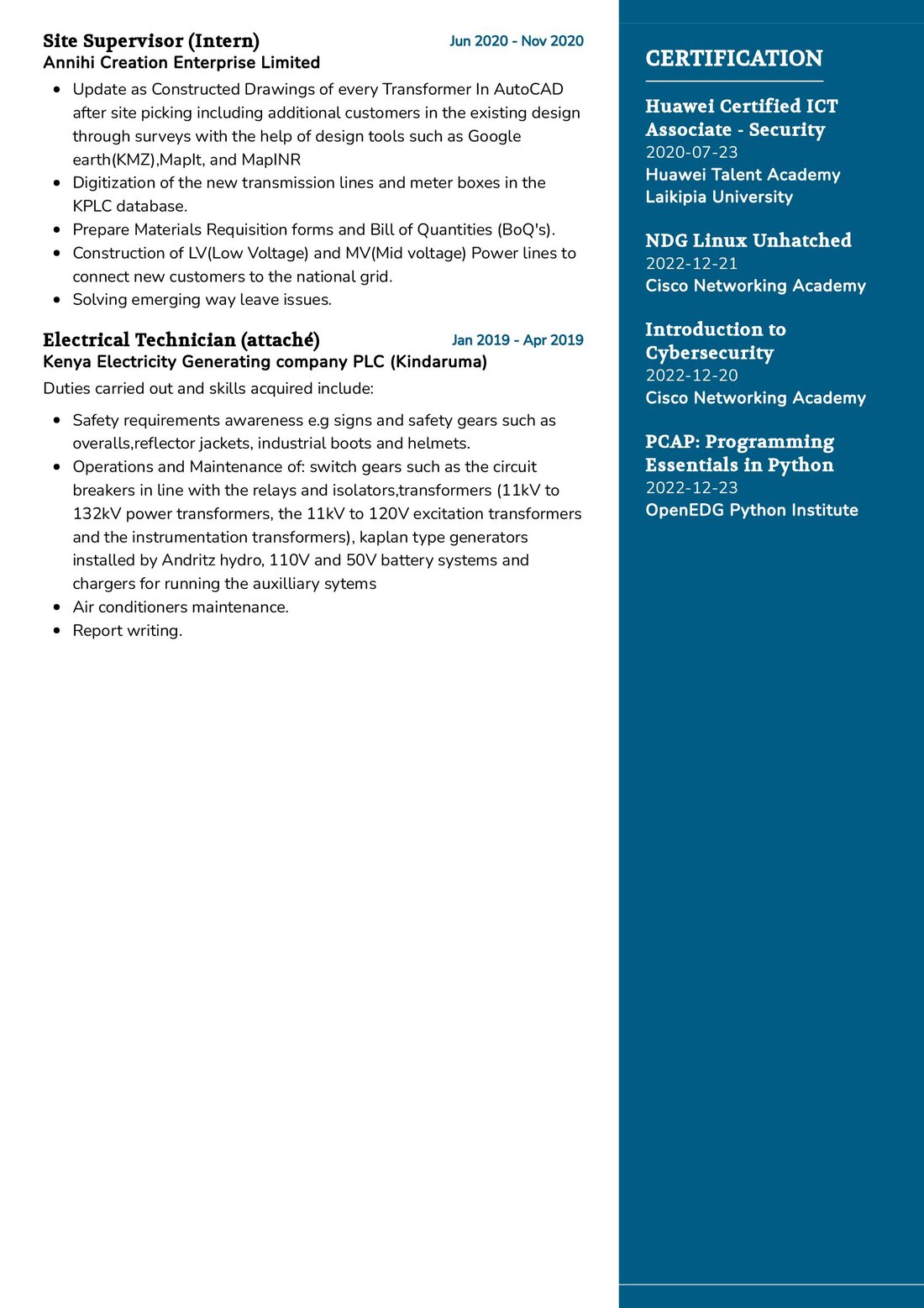What is the Role of a Graduate Electrical Engineer?
For many aspiring engineers, the role of a Graduate Electrical Engineer marks the beginning of a promising career journey in the realm of electrical systems and technology. This pivotal role entails a blend of technical expertise and practical application, offering a platform to delve into the complexities of electrical engineering. Let’s delve deeper into the multifaceted role of a Graduate Electrical Engineer, a position that demands a deep understanding of electrical systems coupled with the enthusiasm to apply theoretical knowledge into real-world scenarios.
A Graduate Electrical Engineer is tasked with understanding and applying the principles of electrical engineering to various projects. They often work closely with senior engineers and project managers to contribute to the design, development, and maintenance of electrical systems. Their role also involves troubleshooting technical issues, ensuring that electrical systems operate efficiently and in compliance with industry standards and regulations. Additionally, they play a crucial part in the implementation of new technologies, contributing to the innovation and evolution of electrical systems in diverse fields.
What are the Graduate Electrical Engineer Job Requirements?
To embark on the journey of a Graduate Electrical Engineer, one must meet specific criteria that showcase their understanding of electrical engineering concepts and their capability to apply these principles effectively. Let’s explore the prerequisites that one needs to fulfill to excel in the role of a Graduate Electrical Engineer:
- A Bachelor’s degree in Electrical Engineering or a related field, demonstrating a strong foundation in electrical engineering concepts and principles.
- Proficiency in electrical engineering software tools, such as AutoCAD, MATLAB, and other design and analysis tools.
- Understanding of electrical codes and regulations, ensuring compliance with safety standards and industry practices.
- Strong problem-solving skills, enabling the identification and resolution of complex electrical issues.
- Effective communication skills, facilitating seamless collaboration with cross-functional teams and clients.
- Ability to work in a fast-paced environment, demonstrating adaptability and resilience in challenging situations.
Participating in internships, research projects, or relevant extracurricular activities can enhance the profile of a Graduate Electrical Engineer and provide valuable practical experience.
What are the Responsibilities of a Graduate Electrical Engineer?
The role of a Graduate Electrical Engineer is dynamic and multifaceted, involving a range of responsibilities that contribute to the success of various projects. Let’s uncover the core responsibilities that define this role, each task demonstrating the application of theoretical knowledge into practical solutions:
- Assisting in the design and development of electrical systems, contributing to the creation of innovative and efficient solutions.
- Conducting tests and inspections on electrical systems, ensuring they meet safety and performance standards.
- Collaborating with senior engineers to analyze and interpret data, contributing to the decision-making process for project development.
- Providing technical support to clients and stakeholders, addressing their concerns and ensuring the smooth operation of electrical systems.
- Preparing reports and documentation, detailing project progress, findings, and recommendations for improvement.
- Staying updated with the latest advancements in electrical engineering, integrating new technologies and methodologies into project development.
Each responsibility presents an opportunity for a Graduate Electrical Engineer to hone their skills and contribute meaningfully to the field of electrical engineering.
Graduate Electrical Engineer CV Writing Tips
As you craft your CV, it is crucial to highlight your skills and experiences in a manner that sets you apart from other candidates. Here are some valuable tips to help you create an impressive CV as a Graduate Electrical Engineer:
- Emphasize relevant coursework and projects, showcasing your understanding and application of key electrical engineering concepts.
- Detail any internships or practical experiences, highlighting the specific skills and knowledge gained during these experiences.
- Include any academic achievements or awards, demonstrating your commitment and excellence in the field of electrical engineering.
- Personalize your CV for each application, aligning your skills and experiences with the specific requirements of the role.
Each tip is a step towards creating a compelling CV that effectively highlights your potential as a Graduate Electrical Engineer.
Graduate Electrical Engineer CV Summary Examples
Your CV summary serves as an introduction to your skills and experiences, providing a concise overview of your capabilities as a Graduate Electrical Engineer. Here are some examples to inspire you:
- “Dedicated Graduate Electrical Engineer with a strong foundation in electrical engineering principles and a passion for implementing sustainable and innovative electrical solutions.”
- “Results-driven Graduate Electrical Engineer with hands-on experience in electrical system design and a proven track record of contributing to the successful completion of diverse projects.”
- “Motivated and detail-oriented Graduate Electrical Engineer adept at applying theoretical knowledge to practical electrical engineering solutions, committed to ensuring the highest standards of safety and efficiency.”
Each summary serves as a gateway to your professional journey, showcasing your skills, passion, and potential as a Graduate Electrical Engineer.
Create a Strong Experience Section for Your Graduate Electrical Engineer CV
Your experience section is a testament to your practical application of electrical engineering concepts, highlighting the projects and tasks you have undertaken during your academic and professional journey. Here are some examples to guide you:
- “Contributed to the design and development of a sustainable electrical system for a community project, emphasizing energy efficiency and cost-effectiveness, resulting in a 15% reduction in energy consumption.”
- “Collaborated with a team of engineers to troubleshoot and resolve complex electrical issues in a commercial building, ensuring uninterrupted operations and safety compliance.”
- “Assisted in the implementation of a new electrical technology, streamlining processes and enhancing system performance by 20%, contributing to the overall efficiency of the organization.”
Each experience highlights your hands-on involvement in electrical engineering projects, showcasing your problem-solving skills and practical application of theoretical knowledge.
Sample Education Section for Your Graduate Electrical Engineer CV
Your educational background is the foundation upon which your career as a Graduate Electrical Engineer is built. It is a reflection of your dedication and commitment to the field of electrical engineering. Here’s how you can showcase your educational milestones:
- Bachelor of Science in Electrical Engineering, XYZ University, a journey of exploration and academic excellence, 2021.
- Relevant Coursework: Power Systems, Electrical Circuits, Digital Electronics, providing a comprehensive understanding of core electrical engineering principles and applications.
- Recipient of the Dean’s List Award, recognizing academic excellence and commitment to the field of electrical engineering, 2020.
Each educational achievement demonstrates your academic prowess and dedication to the field of electrical engineering.
Graduate Electrical Engineer Skills for Your CV
Your skill set is a valuable asset that distinguishes you as a competent Graduate Electrical Engineer. It is a reflection of your capabilities and expertise in the field of electrical engineering. Let’s outline the essential skills that a Graduate Electrical Engineer should possess:
Soft Skills:
- Problem-solving abilities, the capability to identify and address complex electrical issues effectively.
- Effective communication skills, enabling seamless collaboration with team members and clients.
- Analytical thinking, the capacity to assess data and make informed decisions in electrical engineering projects.
- Time management skills, ensuring efficient project planning and completion within designated timelines.
- Adaptability and flexibility, the ability to adjust to evolving project requirements and industry changes.
Hard Skills:
- Proficiency in electrical engineering software, such as AutoCAD and MATLAB, facilitating the design and analysis of electrical systems.
- Knowledge of electrical codes and regulations, ensuring adherence to safety standards and industry practices.
- Understanding of circuit design and analysis, contributing to the development of efficient and reliable electrical systems.
- Experience with electrical testing equipment, enabling accurate assessment and evaluation of electrical systems.
- Familiarity with power distribution systems, enhancing the ability to design and implement effective electrical solutions.
Each skill highlights your expertise and competence as a Graduate Electrical Engineer, positioning you as a valuable asset in the field.
Most Common Mistakes to Avoid When Writing a Graduate Electrical Engineer CV
While creating your CV, it is crucial to avoid common mistakes that can hinder your chances of securing your desired role. Let’s identify some of these pitfalls and how to steer clear of them:
- Avoid providing vague or ambiguous information about your academic and professional experiences, ensuring clarity and specificity in your CV.
- Steer clear of listing irrelevant skills or experiences, focusing only on those that are directly related to the field of electrical engineering.
- Do not overlook the importance of formatting and layout, ensuring that your CV is well-organized and visually appealing.
- Avoid grammatical errors and typos, as they can undermine the professionalism and credibility of your CV.
- Do not neglect the importance of a cover letter, as it serves as a personalized introduction to your CV and can significantly enhance your application.
Avoiding these common mistakes can significantly enhance the effectiveness of your CV as a Graduate Electrical Engineer, increasing your chances of securing your desired role in the field.
Key Takeaways for Your Graduate Electrical Engineer CV
As you conclude the creation of your CV, keep in mind the following key points to ensure its effectiveness and impact:
- Highlight your practical experiences and achievements, emphasizing your contributions to electrical engineering projects and initiatives.
- Emphasize your proficiency in electrical engineering software and tools, showcasing your technical expertise and competence in the field.
- Demonstrate your commitment to continuous learning and development, showcasing any relevant certifications or professional development activities.
- Personalize your CV for each application, aligning your skills and experiences with the specific requirements and expectations of the role.
Finally, feel free to utilize resources like AI Resume Builder, CV Design, CV Samples, CV Examples, CV Skills, CV Help, CV Synonyms, and Job Responsibilities to create an outstanding CV and prepare for the Graduate Electrical Engineer job interview.



